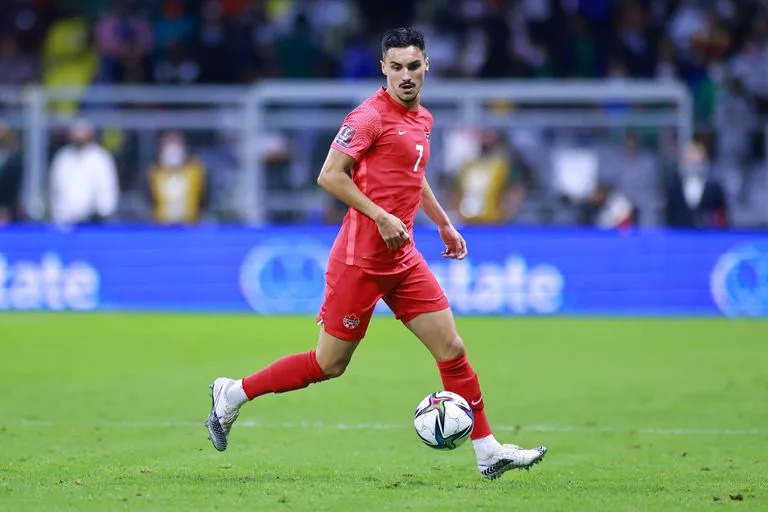The old debate about whether a footballer is born or made always finds examples in favor of one position and the other. No one disputes that the chosen ones play with an advantage: they bring innate abilities that will later be enriched with practice and experience. But, can a fan of the game who does not have a high dose of talent from birth become a crack? In other words, is it possible to learn so much as to be an irreplaceable figure in a team at a World Cup? Those who believe that they can already take Stephen Eustáquio as an example.
The central midfielder from Porto and Canada is a specimen not easily found in the world of football, an obsessive in the study of the game, almost a nerd capable of spending hours during family vacations reviewing videos of old matches to see how he could better resolve an action that did not leave him satisfied.
The story of his family is that of so many who chose to migrate in order to improve his situation. Natives of Nazaré, on the Portuguese coast, the Eustáquios decided to go to Canada shortly after having Mauro, their first child. Some time later, already in Ontario, Stephen was born. Seven years passed and the children already felt an irrepressible love for football, when the parents decided to return to their homeland. It was in Portugal where the younger of the two, the more cerebral, would become a kind of detective of the game, a constant scrutinizer of the movements that a central midfielder must make to reduce, cover, recover and give a clean exit to the ball, and also to gain deep passes, finish off from outside, step on the area and reach the goal.
“My father always said that to grow in football we had to study the game and that the day we didn’t was a day of development that we lost,” says Mauro, and his brother not only took it literally but it even went further. In full adolescence he adopted a one hundred percent professional behavior. He stopped eating fried foods and fats, he began to sleep the necessary hours each night even though that meant being the first to leave parties and meetings, he completed his physical training in a gym… and he took a notebook to his training sessions at União Leiria to record the aspects to improve based on the work done. At that time he was 14 years old.
From the first crashes with the friends of his brother, four years older, Stephen understood that everything he did would require sacrifice. From colliding with more physically “made” guys to withstand the blows to taking each subject of the long degree in holding midfielder that he was willing to undertake: the location on the court, the management of efforts, the movements to gain meters and seconds in the cut, the reception of a pass. Intelligence and what some of his coaches called “high soccer IQ” allowed him to pass all of them with good grades.
At the same time, his exact analysis of his possibilities pushed Eustáquio to make decisions that the others sometimes did not understand. Like leaving the Leiría youth team at age 17, which faced the biggest rivals in the country, to go to Torreense, in the third category, because he understood that to acquire tactical awareness and learn to win free kicks using his body, it was better for him a championship of more veteran people, even if it had a lower level.
When in 2017 he signed for Leixões, from the second category, the results of such a thorough preparation began to be evident. He was called up to the Portuguese under 21 team, which he shared with João Félix and Diego Jota, and the Chaves club, from the first category of Portuguese football, added him to his ranks.
By then, the representatives of his homeland had already contacted him. John Herdman, the Canadian technical director, offered him to join the project he was putting together to return the country to the World Cup after 36 years. Eustáquio asked him for time to reflect while he collaborated in Portugal’s qualification for the Under 21 Euro Cup. Herdman gave it to him. Not only that. When the player unexpectedly accepted an offer from Mexico’s Cruz Azul shortly thereafter and tore an anterior cruciate ligament 15 minutes into his debut, Herdman kept waiting and calling him on the phone. “They spoke more than a dozen times,” recalls Mauro Eustáquio. “And my brother was very appreciative of Herdman’s sincerity,” he adds.
Once recovered, Stephen returned to Portugal, on loan to Paços de Ferreira, and made the most important decision: “It’s time to return to Canada”, he told his relatives, and said yes to the man who had been most interested in telling with his wisdom. “I am here because I met a fantastic person. He respected my times, my decisions, and never pressured me,” he said when he joined the national team, whose face changed from its premiere in November 2019. Herdman’s response was in tune: “He is a key player , capable of marking the tempo of the match on its own. A coach on the pitch.” That studious computer will debut in a World Cup this Wednesday, when Canada faces Belgium at 16 in Argentina.
Last July, the nerd who never stopped studying finally hit a big one. Porto hired him and the midfielder has already earned the job: 30 games in just over three months, with 5 goals and 5 assists and a very high overall performance. Who said that a crack is only born? Stephen Eustáquio can demonstrate that it is also done. It is a question of intelligence and a lot, but a lot, will.

